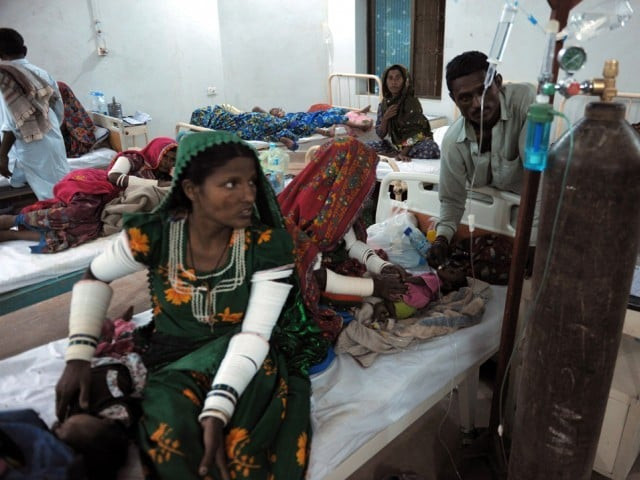Aid agencies seek $11.67m to help 1.3m calamity hit residents of Tharparkar
Those intervention would complement the support so far provided by government authorities from all over Pakistan.

Villagers tending to their sick children affected by a famine at a hospital in Mithi, the capital of Tharparkar district. PHOTO: AFP
The United Nations (UN) says that more funds are urgently required to scale up support for nutrition interventions, including sustainable development solutions, to tackle the nutrition crisis in the drought-affected Tharparkar region. The UN and its partners have been providing nutritional support in Sindh since 2010, assisting 1.7 million children and 800,000 pregnant and lactating women through malnutrition management, nutrient supplementation, and health and nutrition counselling.
The UN’s scaling up plan would help establish 44 community-based malnutrition treatment sites, provide emergency health services, build and rehabilitate water harvesting structures, establish health and nutrition surveillance systems and provide livelihood support, concentrated animal feed and vaccination of small ruminants.
Those intervention would complement the support so far provided by government authorities from all over Pakistan that in the last six months distributed more than 15,000 tons of food items, including wheat, rice and food packs to families in need, and vaccinated 2.2 million livestock.
“The 2011 National Nutrition Survey tells us that 44% of children under five in Pakistan are stunted, 32% underweight and 15% suffer from acute malnutrition. Considering the situation in Tharparkar as exclusive to drought conditions is not accurate,” said United Nations Resident Coordinator and Humanitarian Coordinator in Pakistan Timo Pakkala, while highlighting the main causes of the recent surge in morbidity and mortality rates of children and adults in Tharparkar and surrounding districts.
Pakkala added that reports in early March 2014 highlighted a rising number of malnutrition-related, clinical admissions and child mortality in Tharparkar district.
According to 2013 Nutrition Information System data summary, 21% of children are acutely malnourished , with areas adjacent to Tharparkar, mainly Umerkot and Sanghar, facing a similar situation. Pakkala called the nutrition crisis in Pakistan a silent emergency requiring urgent attention and investment, and added that the situation is bound to recur, unless root causes are addressed.
“Resilience is what we are after here. Crisis and disasters are naturally unpredictable. Creating resilient communities is what bridges relief and development efforts. I encourage the Sindh government to consider funding the scaling up of nutrition programmes in Tharparkar and other districts from its development budget,” Pakkala said.
A combination of famine and malnutrition along with other diseases in Thraparkar have claimed the lives of nearly 180 children and infants in the area. The federal government has already allocated Rs1 billion for aid.



















COMMENTS
Comments are moderated and generally will be posted if they are on-topic and not abusive.
For more information, please see our Comments FAQ